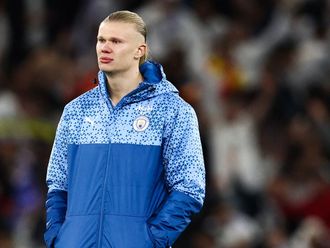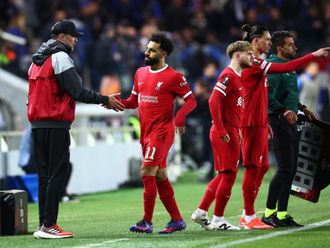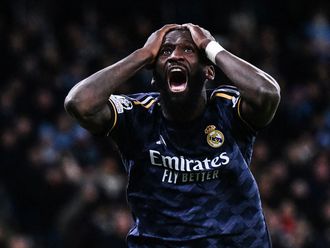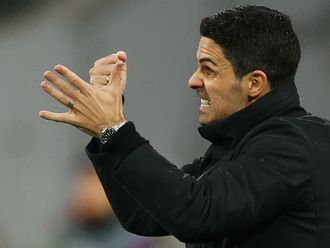Australia will go into this World Cup as one of the underdogs. They are ranked a lowly 59 by Fifa, they have the tough task of facing Spain, Netherlands and Chile in their group, and they are being mentored by a coach who is only a few months into his first major assignment.
However, one man who still can make the Socceroos tick in Brazil is the diminutive Tim Cahill. The hard-tackling attacking midfielder will be playing in his third World Cup and his experience is what is going to matter.
At 34, Cahill is no longer at his supreme best, but he has the experience and the skill, much of it gained in nearly a decade and a half in England — mostly with Everton — and with the New York Red Bulls more recently. How vital his presence is to Australia’s fortunes may be gauged from the fact that there is hardly another name that springs to mind than this slightly-built yet tough top goal-scorer for his country.
When Ange Postecoglou was appointed coach in October last year and promised to give a new generation of players their chance, nobody for a second thought Cahill would be among the old guard dispatched into retirement. Two goals in a friendly against Ecuador in London in March made him Australia’s top marksman with 31 goals in 67 appearances. His scoring success is impressive enough for a midfielder, even before the importance of many of those strikes is considered.
Cahill can rely on his past experiences as well. In Australia’s opening match at the 2006 World Cup in Germany, he came on as a second-half substitute and scored twice as the Socceroos stunned Japan 3-1.
His second campaign in 2010 was not as successful as he received a red card against Germany, causing him to miss Australia’s second match against Ghana. He returned with renewed vigour and scored in Australia’s 2-1 win over Croatia.
Given these facts, Cahill remains the only player in the side who could possibly be described as world class and his fierce competitiveness and desire to succeed might prove to be his biggest contribution in an otherwise inexperienced Australian line-up at Brazil 2014.
Australia
Group B
Fifa Ranking: 59
Top man
|
Tim Cahill |
|
Coach
|
|
Ange Postecoglou |
Best 11 (4-4-1-1)
Ryan; Davidson, McGowan, Franjic, Spiranovic; McKay, Jedinak, Bresciano, Oar; Cahill; Leckie
Squad
Goalkeepers: Mathew Ryan (Club Brugge/BEL), Mitchell Langerak (Borussia Dortmund/GER), Eugene Galekovic (Adelaide United)
Defenders: Ivan Franjic (Brisbane Roar), Jason Davidson (Heracles Almelo/NED), Matthew Spiranovic (Western Sydney Wanderers), Bailey Wright (Preston North End/ENG), Alex Wilkinson (Jeonbuk Motors/KOR), Ryan McGowan (Shandong Luneng/CHN)
Midfielders: Mile Jedinak (Crystal Palace/ENG), Mark Milligan (Melbourne Victory), James Holland (Austria Vienna/AUT), Massimo Luongo (Swindon Town/ENG), Oliver Bozanic (Luzern/SUI), Matt McKay (Brisbane Roar), Mark Bresciano (Al Gharafa/QAT)
Forwards: Tim Cahill (New York Red Bulls/USA), Dario Vidosic (Sion/SUI), Tommy Oar (FC Utrecht/NED), James Troisi (Melbourne Victory), Ben Halloran (Fortuna Duesseldorf/GER), Adam Taggart (Newcastle Jets), Mathew Leckie (FSV Frankfurt/GER)
Group opponents
2014 World Cup qualifying
Topped their third round group with five wins out of six, but struggled in the fourth round and had to win their last game to qualify as runners-up to Japan.
World Cup history
First tournament: 1974 (West Germany)
Appearances (excluding 2014): 3
Best finish: Last 16 (2006)
Pros
- Coach Ange Postecoglou seems to have struck a balance between youth and experience while assembling his squad for Brazil 2014.
- With skipper Mile Jedinak inspirational in midfield and veteran Tim Cahill taking a final bow, Australia look a compact side capable of rising to the big occasion.
- Many of their players are with prominent clubs in Europe and Asia and this could give the national team an edge.
Cons
- Australia have a tough draw in Group B, facing 2010 finalists Spain and the Netherlands, along with strong South American side Chile.
- With veteran keeper Mark Schwarzer opting out and defender Lucas Neill not finding favour, Australia look susceptible at the back.
- Their overall inexperience may eventually haunt the Socceroos.












